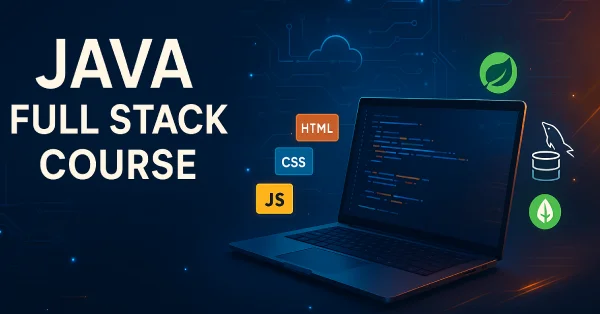Why the Java Full Stack Course Is Still in High Demand
In today’s competitive technology landscape, companies are looking for professionals who can efficiently manage both the client-side and server-side of applications. This growing demand for multi-skilled developers has made the Java course one of the most sought-after programs in the IT sector. With a balanced combination of practical exposure and theoretical depth, the course equips learners with the skills needed to thrive in software development roles.
In our Previous blog, we discussed the core responsibilities of a professional Java developer. Building on that insight, this article focuses on understanding the growing demand and relevance of pursuing comprehensive Java full stack training in today’s competitive technology landscape.
Why the Java Full Stack Course Remains a Top Career Choice
The rapid digitalization of businesses has transformed the way software systems are designed, developed, and maintained. Organizations now prefer developers who possess end-to-end knowledge of application development, rather than those skilled in only one area. The Java full stack program bridges this skill gap by preparing professionals to handle front-end design, server-side logic, database management, and deployment with equal expertise. Its relevance across industries and consistent job demand make it a reliable path for individuals looking to build a sustainable, future-ready IT career. Below are the key reasons why this course continues to attract aspiring developers and working professionals alike.
-
Java’s Reliability and Versatility
Java has remained one of the most trusted programming languages for over two decades, powering everything from enterprise systems and financial platforms to e-commerce applications. Its stability, scalability, and cross-platform capabilities make it a preferred choice across industries. When combined with frameworks like Spring Boot and Hibernate for backend development, and React or Angular for frontend design, Java offers a complete ecosystem for full stack development. A Java full stack development course provides learners with hands-on exposure to these technologies, enabling them to design, build, and deploy secure, high-performance web applications effectively.
-
The Rise of Full Stack Developers
Modern businesses increasingly rely on developers who can manage every layer of application development, from interface design to database management and server-side logic. Java full stack developers are capable of handling the complete software development lifecycle, improving efficiency and reducing the need for multiple specialized roles. Their versatility allows them to integrate different technologies seamlessly, making them key contributors to agile teams that value speed, collaboration, and innovation in fast-paced digital environments.
-
Integration with Modern Technologies
One of the main advantages of Java full stack learning is its alignment with modern development practices and tools. Students gain practical experience with advanced technologies such as Spring Boot, Microservices, REST APIs, Docker, Kubernetes, and popular cloud platforms like AWS and Azure. Top software training institutes incorporate these technologies into their courses to ensure learners are well-prepared for current industry expectations and can confidently adapt to evolving frameworks and software trends.
-
Strong Career Opportunities
The demand for Java full stack developers continues to grow in both domestic and international job markets, driven by the rise of digital transformation across industries. Leading companies such as TCS, Infosys, Accenture, Cognizant, and Amazon consistently recruit professionals with full stack expertise. Entry-level developers typically earn between ₹5–10 LPA, with higher salaries for experienced professionals possessing strong project experience. This consistent demand highlights Java full stack development as a stable and rewarding career choice with significant growth potential.
-
Comprehensive Skill Development
A well-structured Java course builds proficiency across multiple domains of software development, including Core Java, Object-Oriented Programming, and front-end technologies like HTML, CSS, JavaScript, React, or Angular. Learners also gain expertise in back-end frameworks such as Spring Boot and REST APIs, database management with MySQL and MongoDB, version control using Git and GitHub, and basic DevOps tools for deployment. These comprehensive skills enable developers to handle complete project workflows and become job-ready from the very beginning of their careers.
-
A Future-Proof Career
Java’s continuous evolution with improved performance, enhanced security, and strong cloud integration ensures that it remains relevant despite the emergence of new languages and frameworks. As organizations increasingly adopt cloud-native applications and microservices architecture, Java developers are positioned to play a central role in building and maintaining scalable, efficient systems. This adaptability makes Java full stack development a future-proof and sustainable career path for professionals aiming for long-term success in the IT industry.
Conclusion
The Java full stack course continues to be a top choice for learners who want to build a strong, future-ready career in software development. With its wide application, comprehensive skill coverage, and high job market demand, it remains a valuable investment for anyone aspiring to enter or advance in the IT field. For expert guidance and hands-on learning from industry professionals, contact us to learn more about course options and career opportunities.






